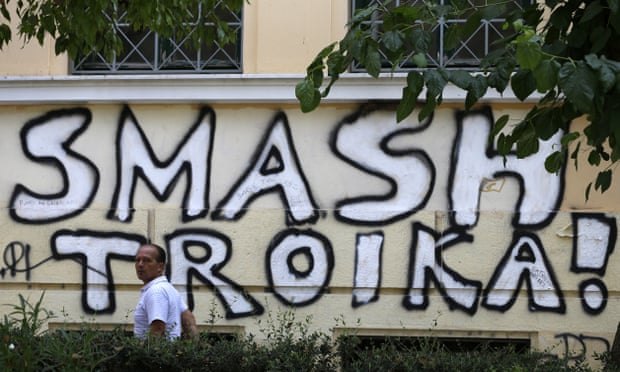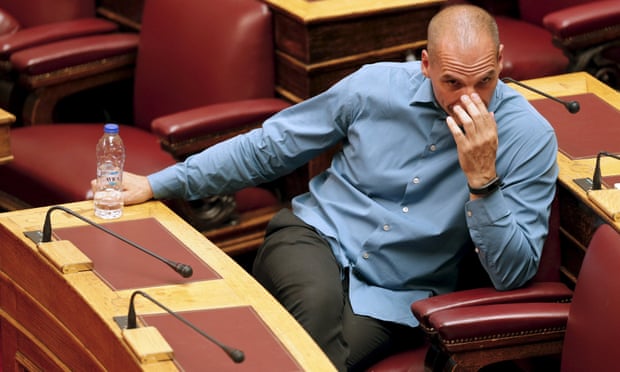The Defeat of Europe
Yanis
Varoufakis
30
July, 2015
- The trouble with Greece
In
2010 the Greek state lost the capacity to service its debt. Put
simply, it became insolvent and, thus, lost access to capital
markets.
To
prevent a default on fragile French and German banks, that had
irresponsibly lent billions to irresponsible Greek governments,
Europe decided to grant Greece the largest loan in world history on
condition of the largest ever magnitude of fiscal consolidation (also
known as austerity) which, naturally, resulted in a world record loss
of national income – the greatest since the Great Depression. And
so began a vicious cycle of austerity-driven debt-deflation,
spearheading a humanitarian crisis and a complete inability to repay
the nation’s debts.
For
five years the troika of Greece’s official lenders (the
International Monetary Fund, the European Central Bank and the
European Commission representing creditor member-states) were
committed to this dead-end strategy that financiers label
‘extend-and-pretend’; that is, lending to an insolvent debtor
more and more money in order to avoid having to write off a bad debt.
The more creditors insisted on this strategy the greater the damage
on Greece’s social economy, the less reformable Greece became, and
the larger the creditors’ loses.
Year
after year, the IMF and the Commission would issue hyperbolic
prognoses of imminent recovery, even to the extent of pre-announcing
‘Greek-covery’ in 2013.
They were, of course, clutching at
straws. For instance, in 2014, creditors and a compliant Greek
government rejoiced at the fact that real GDP rose a little for the
first time in seven years. Closer inspection, however, confirmed that
the reported ‘turnaround’ was a statistical mirage; that what had
really happened was that GDP, as measured in market prices (i.e.
nominal GDP), continued to fall by 1.1% but, at the same time,
average prices were falling even faster by 1.8%. So, what was
essentially a clear sign of a deepening depression, with both incomes
and prices falling, appeared confusingly as a boost in real GDP
(which is the ratio of nominal GDP growth and the rate of inflation;
a ratio that becomes positive in terrible circumstances when both the
numerator and the denominator are… negative)!
This
is why our party of the radical left, SYRIZA, won last January’s
election. Had the electorate believed that Greece was on the mend, we
would not have won. Our mandate was straightforward: To stop the
‘extend-and-pretend’ loans, and the associated austerity, which
were driving Greece’s private sector into the ground.
And to lift
the fog of doom in which it was impossible to carry the people with
us along the road toward the crucial, deep reforms that Greek society
needed.
In
my first Eurogroup meeting I delivered a simple message to the
gathered Eurozone finance ministers: “In our government you will
find a trustworthy partner.
We shall strive for common ground with
the Eurogroup on the basis of a three-plank policy to tackle Greece’s
economic malaise: (i) Deep reforms to enhance efficiency and defeat
corruption, tax evasion, oligarchy and rent-seeking. (ii)
Sound state
finances based on a small but viable primary budget surplus that does
not impose too heavy a burden on the private sector. And (iii)
a sensible rationalisation, or re-profiling, of our debt structure so
as to allow for the viable primary budget surpluses consistent with
the rates of growth necessary to maximise the true value of our
repayments to our credдtors.”
A
few days earlier, on 5th February, I paid my first visit to Dr
Wolfgang Schäuble, the German finance minister. I re-assured him
that he could expect from us proposals aimed not at the interest of
the average Greek but at the interest of the average European – the
average German, French, Slovak, Finn, Spaniard, Italian etc.
Alas,
none of our noble intentions were of any interest to Europe’s
powers-that-be.
We
were to find this out the hard way during the five months of ensuing
negotiations…
- Threats
On
30th January, a few days after I had assumed the Ministry of
Finance, the President of the Eurogroup, Mr Jeroen Dijsselbloem, paid
me a visit. Within minutes he asked me what I was planning to
do vis-à-vis the
Memorandum of Understanding (MoU) that the previous government had
signed up to. I explained to him that our government was elected to
re-negotiate that MoU; that is, we would be asking for an opportunity
to re-visit the blueprint of fiscal and reform policies which had
failed so spectacularly over the past five years, having diminished
national income by one third and having turned the whole of Greek
society against the very notion of reform.
Mr
Dijsselbloem’s response was immediate and crystal clear: “That
won’t work. It is either the MoU or the program crashes.” In
other words, either we would have to accept the failed policies that
were imposed on previous Greek governments, and which we were elected
to challenge, or our banks would be shut down – for this is what a
‘crashed program’ entails in the case of a member-state that has
no market access: the European Central Bank removes financing of the
banks whose doors and ATMs then shut down.
This
blatant attempt at blackmailing an incoming, democratically elected
government was no one off. In the Eurogroup meeting that followed
eleven days later, Mr Dijsselbloem’s disregard for democracy’s
most basic principle was confirmed, and enhanced, by Dr Schäuble who
spoke immediately after M. Michel Sapin. The French Minister of
Finance had just argued in favour of discovering common ground
between (A) the validity of the existing MoU and (B) the right of the
Greek people to mandate us to re-negotiate crucial parts of the MoU.
Dr Schäuble lost no time to give short shrift to M. Sapin’s
reasonable point: “Elections cannot be allowed to change anything”,
he said with a large majority of finance ministers nodding along.
At
the end of that same Eurogroup meeting, while negotiating the joint
statement to be released, I asked that the word “amended” be
added in front of “MoU” in a sentence that was meant to commit
our government to the latter. Dr Schäuble vetoed my proposed phrase
of an “amended MoU” saying that the existing MoU is not to be
negotiated just because a new government was elected by the Greeks.
After a few hours of the resutling stand-off, Mr Dijsselbloem
threatened me with an imminent “program collapse” (which
translated into bank closures by the 28th of February) if I
insisted on adding “amended” in front of “MoU”. On that
night, on instructions from my Prime Minister, I left the meeting
without a communiqué being agreed to, ignoring Mr Dijsselbloem’s
threat. On that occasion the threat proved empty. But it was not long
before it returned with a vengeance.
Time
and again we would be threatened with bank closures when refusing to
endorse a program, the MoU, that had so demonstrably failed in every
possible way – macroeconomically, in terms of enhancing
microeconomic efficiency, socially, politically. Creditors and
Eurogroup finance ministers refused even to engage with our economic
arguments. They demanded that we capitulate. They even accused me of
daring to “lecture” them on economics in the Eurogroup; i.e. in
the body comprising the Eurozone’s finance ministers!
And
so it was that Greece’s negotiation with its creditors were
conducted: in a dark cloud of threats that our banks would be shut
down if we insisted on straying from the MoU. That the threat was
credible we knew from the outset, even though we were not prepared to
stand down or to lose hope that Europe would change tack.
Even
before we were elected, the previous Greek government, in cahoots
with the Governor of the Bank of Greece (who had previously served as
that same government’s finance minister), had sparked off a mild
bank run a month before the election that brought us to power.
After
our election, the ECB began to signal that it would steadily switch
off the flow of liquidity to Greece’s banking system, thus
reinforcing the deposit flight that, at a time of the Eurogroup’s
choosing, ‘justified’ the closing down of the banks – as Mr
Dijsselbloem had threatened.
- Stonewalling, Propaganda and Fragmentation
The
negotiations, once they commenced at the level of ‘technocrats’,
confirmed our worst fears. The creditors publically proclaimed their
concern for getting their money back and for reforming Greece. In
truth, however, they only cared about humiliating our government and
forcing us to choose between resignation and capitulation, even at
the cost of ensuring that creditor nations would never get their
money back and jeopardising a reform agenda that only our party could
convince Greeks to adopt as their own.
From
the beginning, time and again, we proposed that legislation should be
passed on three or four areas that we agreed with the institutions –
e.g. measures to tackle tax evasion, to shield the tax authority from
both political and corporate influence, to address corruption in
procurement, to reform the judiciary etc. Their reply was: “No
way!” Nothing should be legislated before a ‘comprehensive
review’ was complete.
During
the Brussels Group negotiations, we would be asked to present our
plans for VAT reform. Before we could pin down an agreement on VAT,
the troika representatives would shift to pension reforms. They would
immediately rubbish our proposals before moving on to, say, labour
relations. Once they rejected our proposals on that, they would shift
to privatisations. And so on, ensuring that the discussions moved
from one topic to another, before anything was agreed, without any
serious negotiation on any of topic, creating a process that
resembled a cat chasing its tail. For months the troika
representatives stonewalled, insisting that we should talk about
everything, which is equivalent to negotiating on nothing at all.
Meanwhile,
without having put forward any proposals of their own, and while
threatening us with a cessation of talks if we dared publish our
proposals, they would leak to the press that our proposals were
“weak”, “ill-thought” “not credible”. In hope that they
would, at some point, meet us halfway, we went along with this
impossible process.
Perhaps
the greatest impediment to holding a sensible negotiation was the
fragmentation of our interlocutors. The IMF was close to us on the
importance of debt restructuring but insisted that we should remove
any rights that organised labour retained while destroying the
surviving protections of middle class professionals. The Commission
were far more sympathetic to us on these social issues but forbade
any talk of a debt restructure. The ECB had its own agenda. In short,
each of the institutions different red lines, which meant that we
were imprisoned in a grid of red lines.
Even
worse, we had to deal with our creditors ‘vertical disintegration’,
as the bosses of the IMF and the Commission had a different agenda to
their minions or as the German and Austrian finance ministers had an
agenda totally at odds to that of their Chancellors.
- Defeated friends, Defeated Europe
Perhaps
the most dispiriting experience was to be an eyewitness to the
humiliation of the Commission and of the few friendly, well-meaning
finance ministers. To be told by good people holding high office in
the Commission and in the French government that “the Commission
must defer to the Eurogroup’s President”, or that “France is
not what it used to be”, made me almost weep. To hear the German
finance minister say, on 8th June, in his office, that he had no
advice for me on how to prevent an accident that would be
tremendously costly for Europe as a whole, disappointed me.
By
the end of June, we had given ground on most of the troika’s
demands, the exception being that we insisted on a mild debt
restructure involving no haircuts and smart debt swaps. On 25th June
I attended my penultimate Eurogroup meeting where I was presented
with the troika’s ‘take it or leave it’ offer. Having met the
troika nine tenths of the way, we were expecting them to move towards
us a little, to allow for something resembling an honourable
agreement. Instead, they backtracked in relation to their own,
previous position (e.g. on VAT). Clearly they were demanding that we
capitulate in a manner that demonstrates our humiliation to the whole
world, offering us a deal that, even if we had accepted, would
destroy what is left of Greece’s social economy.
On
the following day, Prime Minister Tsipras announced that the troika’s
ultimatum would be put to the Greek people in a referendum. A day
later, on Friday 27th June, I attended my last Eurogroup
meeting. It was the meeting which put in train the foretold closure
of Greece’s banks; a form of punishment for our audacity to consult
our people.
In
that meeting, President Dijsselbloem announced that he was about to
convene a second meeting later that evening without me; without
Greece being represented. I protested that he cannot, of his own
accord, exclude the finance minister of a Eurozone member-state and I
asked for legal advice on the matter.
After
a short break, the advice came from the Secretariat: “The Eurogroup
does not exist in European law. It is an informal group and,
therefore, there are no written rules to constrain its President.”
In my mind, that was the epitaph of the Europe that Adenauer, De
Gaulle, Brandt, Giscard, Schmidt, Kohl, Mitterrand etc. had worked
towards. Of the Europe that I had always thought of, ever since I was
a teenager, as my point of reference, my compass.
A
week or so later, the people of Greece, despite the closed banks and
the scare mongering of the corrupt Greek media, delivered a
resounding NO in the referendum. On the following day the Euro Summit
responded by imposing on our Prime Minister an agreement that can
only be described as our government’s terms of surrender. And the
Euro Summit’s weapon of choice? The illegal threat of amputating
Greece from the Eurozone.
Whatever
one thinks of our government, this episode will go down in European
history as the moment when official Europe, using institutions and
methods that no Treaty legitimised (e.g. the Eurogroup, the Euro
Summit, the threat of eviction from the Euro Area), dealt a major
blow at the ideal of an ever-closer democratic union.
Greece
capitulated but it is Europe that was defeated.
Epilogue
No
European people should ever again be put in a position of negotiating
in fear. For that to happen, Europeans must not fear to negotiate a
European New Deal that restores the dream of shared prosperity within
a democratic polity. If we fail, barbarism will rise up from within.
For a continent that has generated the best and the worst humans are
capable of, this ought to be a sobering thought.






